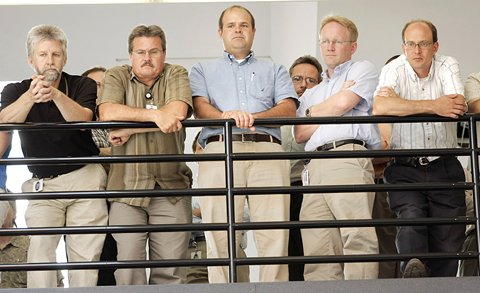The US government will lend US$5.9 billion to Ford Motor Co and US$1.6 billion to Japanese automaker Nissan to invest in improving the fuel economy of their US-built vehicles, officials said on Tuesday.
The loans are the first awarded out of a US$25 billion program to help automakers meet upcoming fuel efficiency standards, US Energy Secretary Steven Chu said at a press conference.
“I’m pleased to announce US$8 billion in provisional loan agreements that will drive innovation in fuel efficiency and help revolutionize the automobile industry in America,” Chu said.

PHOTO: AFP
“These loans will help the auto industry meet and even exceed the president’s tough new fuel standards while creating jobs, reducing our dependency on foreign oil and ensuring America’s competitiveness,” he said.
Another US$465 million will be loaned to electric sports car maker Tesla. Additional loans will be awarded to “large and small automobile manufacturers and parts suppliers up and down the production chain” over the coming months, said Chu, who vowed to release the funds as quickly as possible.
BAKRUPTCY
The energy department began discussions with Chrysler “the day they emerged from bankruptcy” protection and has already begun reviewing the technical aspects of General Motors’ request in the hopes that it will successfully emerge from bankruptcy protection, Chu told reporters.
Ford will use the US$5.9 billion retool plants in five states and boost the fuel efficiency of close to 2 million new vehicles annually. The department of energy estimates these upgrades will lead to fuel savings of more than 20 million gallons (75.7 million liters) of gasoline a year.
That would produce a savings of more than US$500 million a year for US drivers at current fuel prices, Chu said.
Nissan will use the loans to modify its Tennessee plant to produce zero-emissions electric vehicles as well as the lithium-ion battery packs to power them.
With this loan, “Nissan expects to cut the costs of its batteries in half and ramp up production of 150,000 American-made competitively priced electric vehicles annually,” Chu said.
Ford chief executive officer Alan Mulally embraced the “historic green partnership” and said the automaker was committed to investing nearly US$14 billion in advanced technology vehicles in the next seven years.
Nissan welcomed the loan and said it is “committed to being a leader in zero-emissions mobility.”
“This loan is an investment in America,” Dominique Thormann, senior vice president for Nissan North America, said in a statement. “It will help us put high-quality, affordable zero-emissions vehicles on our roads.”
California-based Tesla Motors said it will use US$365 million for production, engineering and assembly of the Model S, an all-electric family sedan that carries seven people and travels up to 300 miles (483km) per charge. The additional US$100 million will be used for a powertrain manufacturing plant.

MISINFORMATION: The generated content tends to adopt China’s official stance, such as ‘Taiwan is currently governed by the Chinese central government,’ the NSB said Five China-developed artificial intelligence (AI) language models exhibit cybersecurity risks and content biases, an inspection conducted by the National Security Bureau (NSB) showed. The five AI tools are: DeepSeek, Doubao (豆包), Yiyan (文心一言), Tongyi (通義千問) and Yuanbao (騰訊元寶), the bureau said, advising people to remain vigilant to protect personal data privacy and corporate business secrets. The NSB said it, in accordance with the National Intelligence Services Act (國家情報工作法), has reviewed international cybersecurity reports and intelligence, and coordinated with the Ministry of Justice Investigation Bureau and the National Police Agency’s Criminal Investigation Bureau to conduct an inspection of China-made AI language

BOOST IN CONFIDENCE: The sale sends a clear message of support for Taiwan and dispels rumors that US President Donald Trump ‘sold out’ the nation, an expert said The US government on Thursday announced a possible sale to Taiwan of fighter jet parts, which was estimated to cost about US$330 million, in a move that an expert said “sends a clear message of support for Taiwan” amid fears that Washington might be wavering in its attitude toward Taipei. It was the first announcement of an arms sale to Taiwan since US President Donald Trump returned to the White House earlier this year. The proposed package includes non-standard components, spare and repair parts, consumables and accessories, as well repair and return support for the F-16, C-130 and Indigenous Defense Fighter aircraft,

CHECKING BOUNDARIES: China wants to disrupt solidarity among democracies and test their red lines, but it is instead pushing nations to become more united, an expert said The US Department of State on Friday expressed deep concern over a Chinese public security agency’s investigation into Legislator Puma Shen (沈伯洋) for “secession.” “China’s actions threaten free speech and erode norms that have underpinned the cross-strait ‘status quo’ for decades,” a US Department of State spokesperson said. The Chongqing Municipal Public Security Bureau late last month listed Shen as “wanted” and launched an investigation into alleged “secession-related” criminal activities, including his founding of the Kuma Academy, a civil defense organization that prepares people for an invasion by China. The spokesperson said that the US was “deeply concerned” about the bureau investigating Shen

LIMITS: While China increases military pressure on Taiwan and expands its use of cognitive warfare, it is unwilling to target tech supply chains, the report said US and Taiwan military officials have warned that the Chinese People’s Liberation Army (PLA) could implement a blockade within “a matter of hours” and need only “minimal conversion time” prior to an attack on Taiwan, a report released on Tuesday by the US Senate’s China Economic and Security Review Commission said. “While there is no indication that China is planning an imminent attack, the United States and its allies and partners can no longer assume that a Taiwan contingency is a distant possibility for which they would have ample time to prepare,” it said. The commission made the comments in its annual